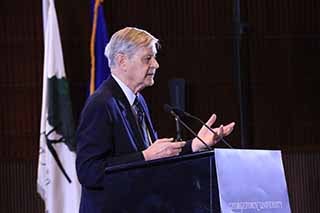Distinguished Scholar of Islamic History Speaks at Georgetown in Qatar

Distinguished scholar, Dr. John O. Voll, professor of Islamic history at Georgetown University in Washington D.C., was in Education City at the school’s Qatar campus (GU-Q) recently to deliver a public lecture titled “Religion in 21st Century Global Affairs”, in which he reflected on the changing role of religion in modern life.
Dr.Al-Arian, an assistant professor of history at GU-Q, introduced the distinguished speaker, who is set to retire at the end of the semester, saying: “Dr. Voll was my mentor during my intellectual foundation. And now, it’s a pleasure that he takes part in the class I teach through the RPX virtual classroom here in Doha, and such a treat for our students, especially since this is his final semester of teaching.” The RPX technology allows Georgetown students in Qatar to take undergraduate courses classes from well-known professors in Washington D.C. and allows students in Washington to learn from the world-class faculty that are located in Qatar.
Speaking to an audience of students, faculty, staff, and guests from the Doha community at Georgetown University in Qatar (GU-Q), the prolific writer and thinker asked: “Look at how many social scientists in the 1960’s promised us that religion was going to disappear. Of course it didn’t, so what I want us to think about is this question: Why is religion still around?”
In answer to his question, Dr. Voll points to the prevailing theory that religion did not disappear because “alternatives failed” – modern secularism, which was previously hailed as the replacement for religion, failed to meet the needs of modern society. But he suggests that the actual reason religion is on the rise is because traditional religion has changed, taking “a different form from the religion of the previous century.”
He began by establishing the pervading theories of the 60s, saying: “What both said is that traditional society was going to disappear, and traditional religion as a part of traditional society would disappear, but they weren’t talking about the end of religion, but about the transformation of traditional society.”
Through a series of photographic slides, he contrasted various Islamist movements in the 20 and 21st century, and demonstrated how major Muslim leaders around the world in the previous century were very modern in their dress, unlike the religious leaders of today whose personal appearance is strongly connected to specific cultural identities. He also cited the shift from “popular religion” to “pop star religion” in the rise in well known religious television personalities who appeal to younger demographics. “Religion has survived in the 20th century by making this kind of transformation, by finding modes for expressing the eternal unchanging truths in ways that are meaningful to the social and political context in which people live,” he explained.
Coming back to secularization theory’s perceived failures in correctly gauging the resurgence of religion’s influence, Dr. Voll defends it, saying: “secularization theory is built on the idea that modernization will change traditional religion, not end religion, and change the practices associated with traditional society.”